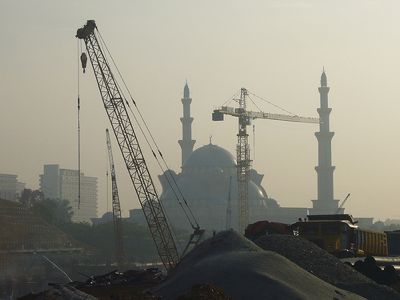A large proportion of the population was engaged in agriculture and poverty was endemic. There was hardly any industry to speak of and those industries that did exist were small-scale and domestically oriented.
Making matters even more tenuous was the multi-racial population, with a large percentage of immigrants. Like elsewhere in Southeast Asia, but more so, ethnic Chinese dominated most aspects of commercial life and formed a powerful urban mercantilist class. Native Malays were still to be found on the land while Indians mainly worked the rubber estates.
Out of this diverse ethnic milieu, there was a political accord to be crafted and a nation built. The accord produced government by a coalition of the three largest ethnic political parties. This grand compromise set the template of governance in Malaysia where the majority of political parties are ethnic- based.
But the forging of a critical nexus between political legitimacy and economic and social performance is one of the key reasons why Malaysia has largely managed to side-step the fractious ethnic infighting that has plagued many other countries. It was the promise of a better standard of living that enticed the Malays to share political power with the non- Malays, while it was the promise of non-Malays being able to accumulate wealth that spurred them to cooperate.
Fast-forward 53 years. Apart from three recessionary episodes in 1985, 1998 and 2009, the Malaysian rakyat (people) have seen significant improvements in their standard of living. Malaysia’s economy has now become more globally integrated and, as the 18th largest trading nation, it hosts a large stock of foreign direct investment and is a major exporter of electronic semiconductors and palm oil.
With a per capita income of $US6800, it is classified as a middle income country but one that is at the low end of the scale. Economic growth after the Asian crisis in 1998 has moderated; as it did in many other East Asian economies. Even in purchasing power parity terms, Malaysia’s standard of living is only comparable to that of Turkey or Ukraine, a big step from where it was but requiring an even bigger leap to make it to the middle rungs of advanced economies.
There have been dramatic social changes too. Absolute poverty has markedly declined from over 50 per cent of households to around 5 per cent. Of equally striking impact has been the effect of mass education. This has not come cheaply. Up to a fifth of annual budgets have consistently gone to the building of schools and universities. Investments in socio-economic infrastructure have also been a focal point. Malaysia boasts some of the best public facilities in Southeast Asia, something that first time visitors never fail to notice. And these are not confined only to major urban centres. The national preoccupation with development has meant that public amenities can be found in all but the most remote villages.
The satiation of basic needs has given rise to new and non-materialistic ones. Most evident in society is a spiritual dimension. Increasing religious devotion spans the entire spectrum, not only among Muslims but also Christians, Buddhists, Hindus and myriad others. Also rising to the surface, especially among the urban elite, are demands for greater freedom of expression, for a less paternalistic form of government, and a more globalised, liberal and ultimately universal value system.
Running against these trends, however, are demands for greater ethnic cohesion, for political privilege, for a return to conservative traditional values, and for a greater share of the economic spoils. As elsewhere, proponents of these ideas have strong political platforms from which to make their claims. Some political developments have not been widely regarded as positive and there have been accusations of harsh authoritarianism, as there have been in other East Asian countries. Ethnic and religious tensions may have been effectively managed—on occasion just barely—but they have not disappeared.
In many senses, in defeating the enemy of under-development, Malaysia may have done too well and the country runs the risk of becoming a victim of its own successes.
So discussions about escaping the middle-income trap must go beyond economic prerogatives to include social inclusiveness and the sustainability of growth. The question for now and the future lies not so much in the specific details, significant though they are, but in whether the nexus that was created 53 years ago between political legitimacy, economic performance and social stability, can remain or whether it will unravel.
Mahani Zainal Abidin is Chief Executive of the Institute of Strategic and International Studies, Malaysia. She has a PhD from the University of London. Steven Wong is Assistant Director General of the Institute of Strategic and International Studies, Malaysia, and concurrently Director of its East Asia Economic Centre and the Centre for China Studies.

